When You Dreamed of Fishes Funny Memes
Discover the secrets and peculiarities of 10 of the most common fishes in the Maldives in this illustrated snorkeling guide.
In the Maldives, where more than 2000 fish species live and where snorkeling is a MUST-DO, you will meet countless multicolored sea creatures with various shapes and patterns.
If the simple fact to meet them is amazing, being able to identify them and know more about their little rituals is even more fascinating.
Follow me to discover more about your future usual companions…
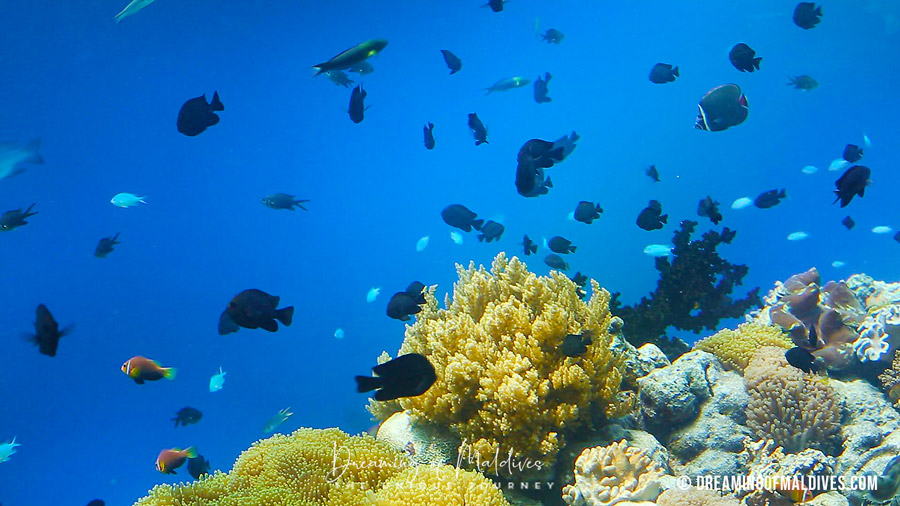
Maldives waters are an endless playground swirling with fishes and colors.
There, just in front of your mask, you will meet countless tropical fishes with pretty names and colors : Moorish idols, quintessence of the reef fishes, schools of Oriental sweetlips, the noisy coral-nibbling parrotfish, clownfishes hidden in their anemones like Nemo, strange looking and ferocious Trumpetfishes, Picasso triggerfishes, living works of art,…the list goes on and on…
The 10 fishes that you will surely meet while snorkeling in Maldives
Put on your snorkeling gear and enter the clear blue waters of the Maldives, these are your future underwater companions.
Take the time to look at them carefully as they are all as beautiful as they are exciting and fun to watch.
- The Parrotfish
- The Moorish idol
- The Chinese trumpetfish
- The Powder blue surgeonfish
- The Clownfish
- The Convict surgeonfish
- The Threadfin butterflyfish
- The Blacktip reef shark
- The Picasso triggerfish
- The Oriental sweetlips
Before you go living the underwater Dream. Here are as usual,
The 3 rules of a well-behaved snorkeler
Marine Ecosystem is fragile, extremely fragile.
– Please –
DO NOT touch anything. Coral included !
DO NOT step on Corals
DO NOT litter
► You will find all Tips and Advices for Snorkeling here.
The Parrotfish
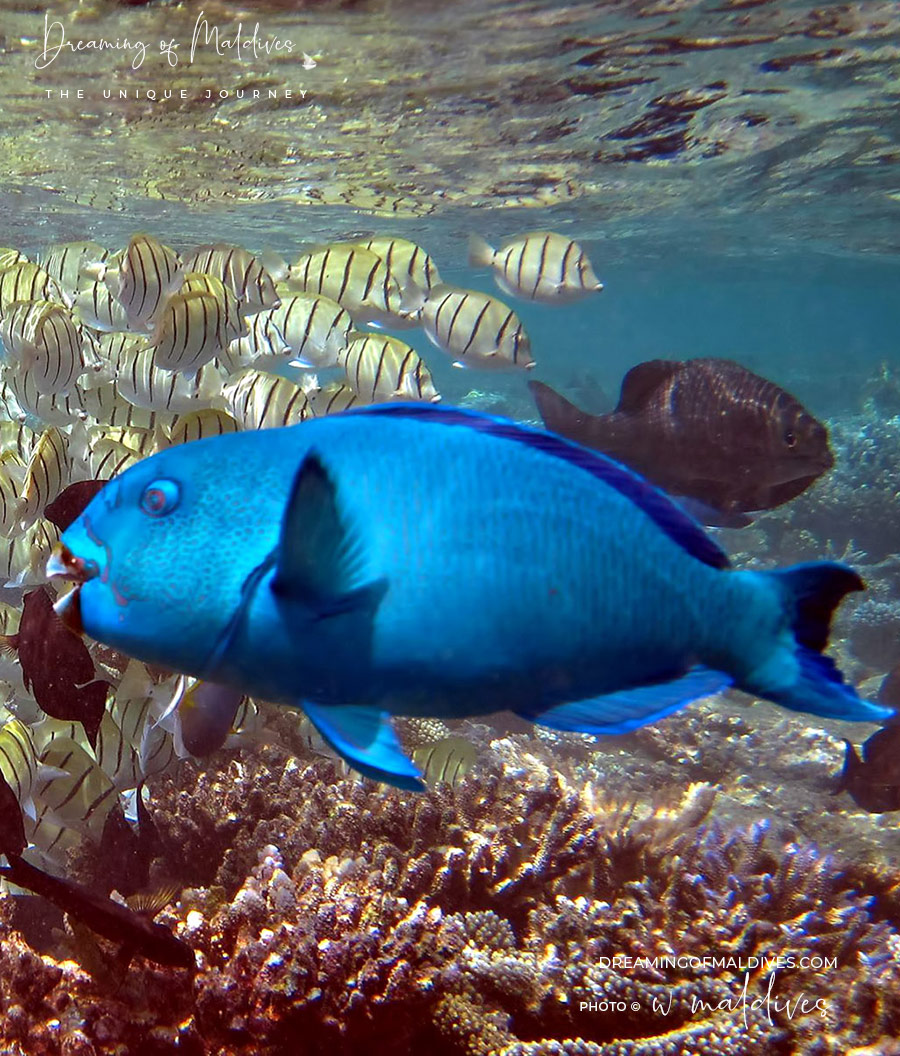
The Parrotfish is my favorite in this list. They are the funniest encounter of my snorkeling explorations. They are not only super colorful ( their colors remind of parrots from which they took their names ) but also make an unmistakable noise !
Parrotfishes have a strong beak which is also similar to parrots and spend a lot of time nibbling algae from corals and rocks.
There is something more about the parrotfish : they poop back the corals and stones that are not digested into sand.
Their poop compose a large quantity of the beautiful Maldives sand.
One Parrotfish eats enough coral in one year to produce a ton of sand.
Yes, the fine sand that you love in the Maldives is partly poop. It is said that they eat so much corals that a single individual can produce a ton of sand per year.
Take some time to observe them. Their little business is a guaranteed educational show with audio !
Parrotfish were added to the list of marine protected species in the Maldives in 2020.
Scientific name : Scaridae
The Moorish Idol
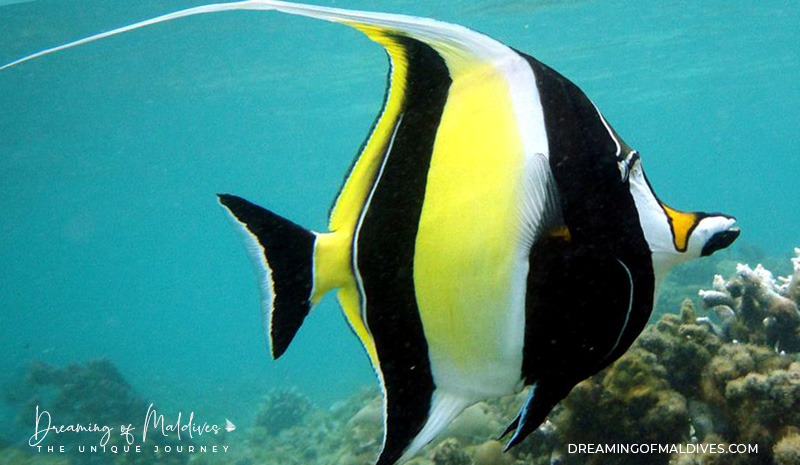
You will surely see the magnificent moorish idol in the Maldives and this, from your first dives, even in shallow waters.
Often solitary (or in small groups of 3/4 individuals, but this is rarer), the moorish idol generally evolves in 2 or 3 meters depth but you might also spot it in deeper waters, on the island drop-off.
Considered as one of the most beautiful tropical fish, the elegant moorish idol can reach up to 25 cm in length and is easily spotted.
Moorish Idols are often confused with the Schooling Bannerfish and the Pennant Coralfish.
The moorish idol is often confused with the schooling bannerfish or its cousin the pennant coralfish. It is true that to the untrained eye and without precise details, they can be confused one for another.
Hereunder are schooling bannerfishes :
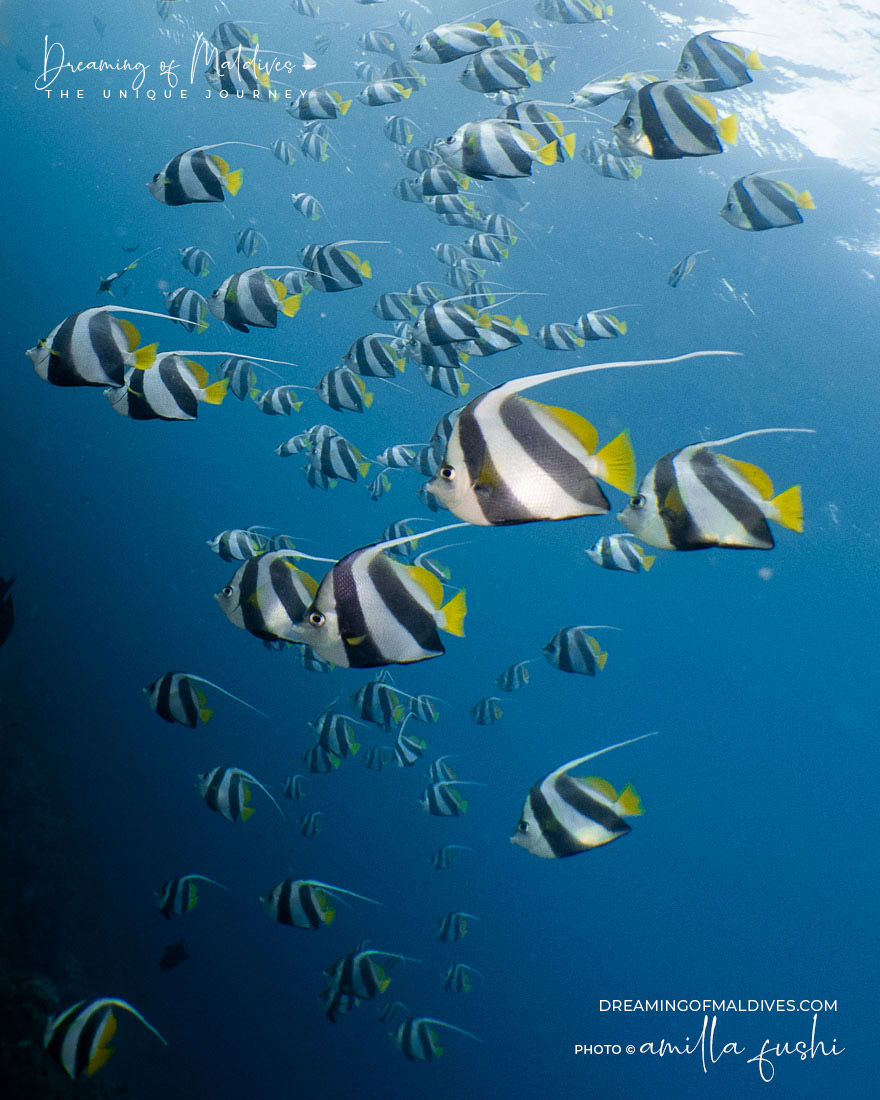
Pretty similar, right ?
In order to know if you are meeting the iconic reef fish that the moorish idol is, or a fish from the Butterfly family, which are also beautiful, but not as much :-), there are several differences to remember.
If you are interested in playing this little Spot the Difference game, you will find it here.
One last thing : Gill in the movie Finding Nemo is a moorish idol.
Scientific name : Zanclus cornutus
The Chinese trumpetfish
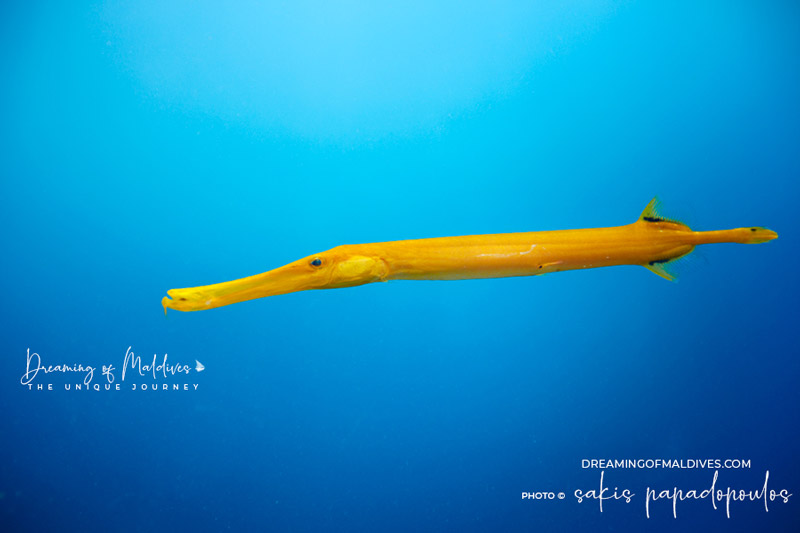
The trumpetfish or flutemouth is a long, elongated fish with a stretched body and jaw, which remind of a flute or a trumpet.
But don't be fooled, underneath its elegant appearance lies a fearsome predator that loves to suck up and eat small fish.
The Trumpetfish is one of the most voracious predators of the reef and a king of camouflage.
Their long mouth is a fast, powerful and precise weapon with strong sucking power. They are king hunters and can change color to blend in, hide in the grass to spy on their prey until they suck in their fooled victim, in a split second.
They generally live alone and are active during the day. In Maldives you will see trumpetfishes in various colors ranging from beige to red, blue or yellow, as in the photo above.
The trumpetfish is often confused with its cousin the cornetfish which looks very similar but is thinner and does not have the same tail.
Scientific name : Aulostomidae.
The Powder blue surgeonfish
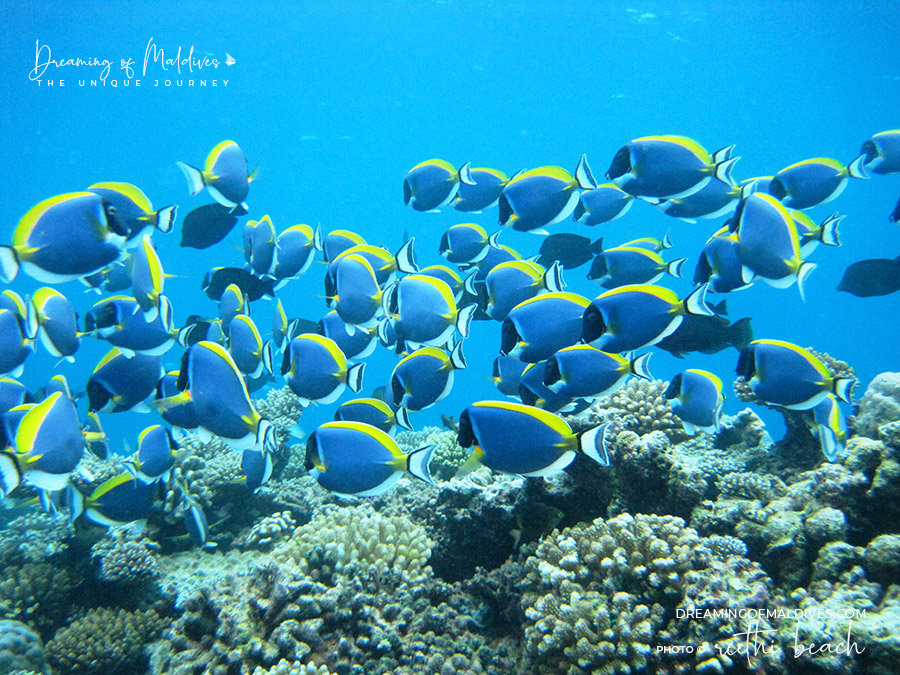
In the Maldives, as in all tropical seas, you will often see powder blue surgeonfishes on the reefs. They can be found alone but are mostly spotted schooling around corals on which they eat algae. They have tiny sharp teeth (too small for us to be seen underwater) and are peaceful to divers.
Surgeonfishes have two sharp parts at the ends of their tails called scalpel.
Like all surgeonfishes – there are about 75 in the family – they can be vindictive with other fishes for territorial reasons or if they feel in danger. In aggressive mode, they tend to attack with their mouth and can injure their enemy with their tail, which has a sharp part called a "scalpel" on each end.
Their colors range from light to dark blue on the body, with yellow on their dorsal fin.
The powder blue surgeonfish is not Dory from Finding Nemo. The adorable amnesiac blue lady is a blue tang fish.
Scientific name : Acanthurus leucosternon.
The Clownfish
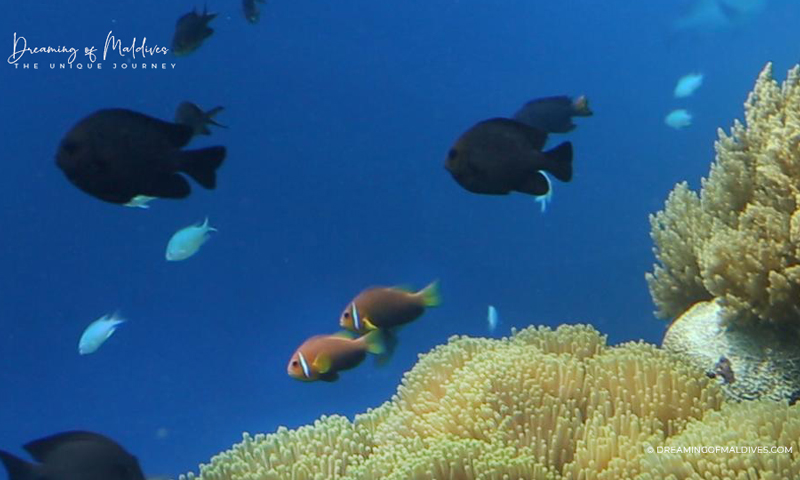
There are about thirty different species of clownfishes around the world.
In Maldives, on the picture above, you will see one of the most common one, the amphiprion nigripes, endemic to the archipelago.
The clownfish is also called anemonefish because of its total symbiosis with it.
The clownfish is one of the only fishes known to live in the venomous tentacles of anemones.
The anemone provides them with a home and a protection as well as food. In return, the clownfish defends the anemone from predators and parasites. It is one of the only fish known to be able to live in these venomous tentacles thanks to a mucus that protects its body.
The Amphiprion Nigripes is a close cousin of Nemo, the adorable star of Pixar, which is the most common clownfish and is called Amphiprion ocellaris .
Scientific name : Amphiprion nigripes.
The Convict surgeonfish
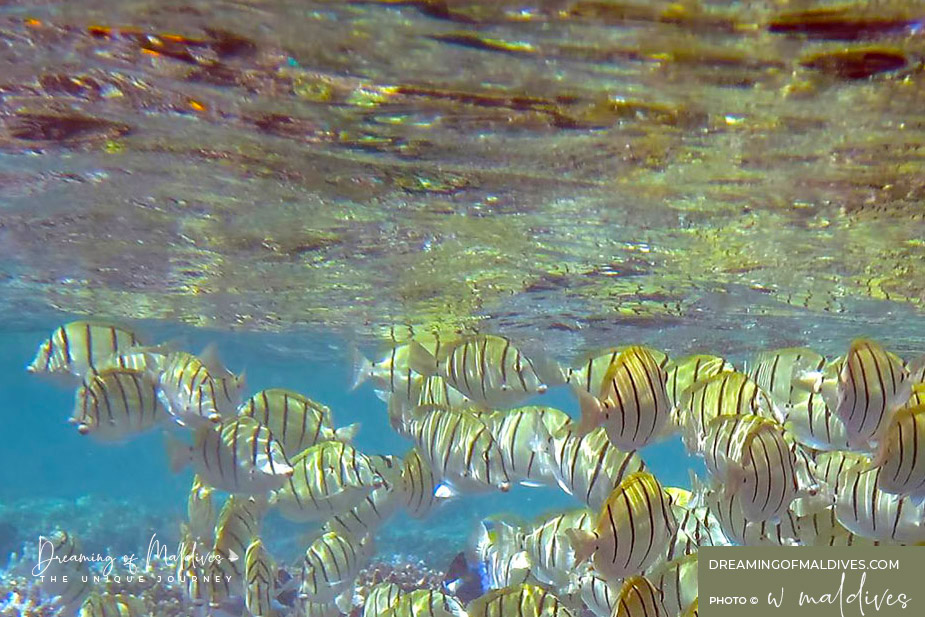
The beautiful convict surgeonfish is also part of the large family of the surgeonfishes.
Reminding of a prisoner with its vertical black stripes on its body, the convict surgeonfish is a schooling specie daily spotted in shallow lagoons.
In the Maldives, as long as you chose to stay on a good island for snorkeling ( Type 1 or 3 ), you will very often see them from your first steps in the lagoon. They are not very shy and can be easily approached.
The Convict Surgeonfish is one of the most common fish in the Maldives.
Just like other surgeonfishes, they spend their time eating the algae that develop on corals and also have this famous "scalpel" on their tail, like the powder blue surgeonfish above, at number 4.
Scientific name: Acanthurus triostegus
The Threadfin butterflyfish
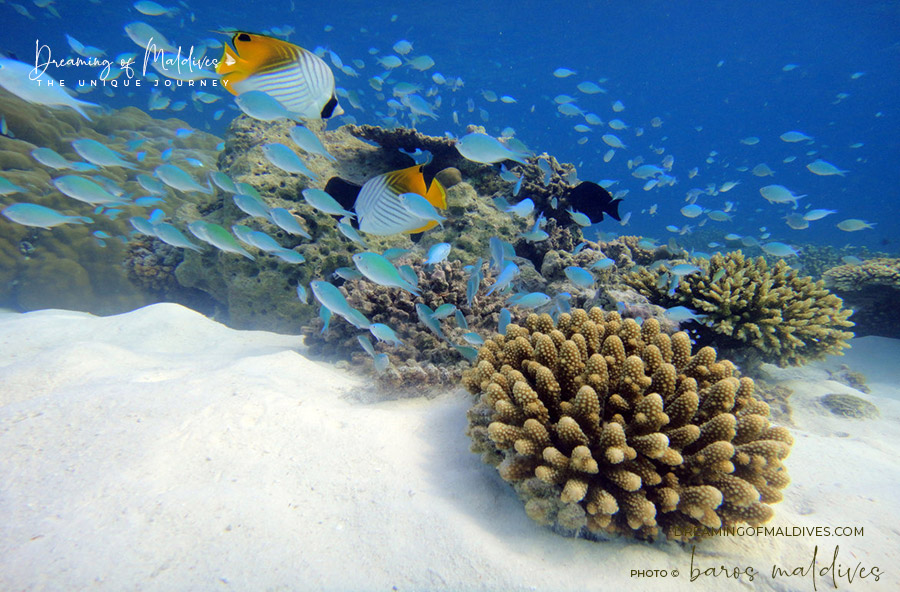
The threadfin butterflyfish is another one of my favorites in this list. It not only has a pretty name but a very graphic coat pattern too.
White, but yellow at the back, it has a large black spot on the soft part of its dorsal fin and a prominent black stripe across the eye.
Its beauty especially lies in the 2 series of oblique gray lines that cross its body and meet at right angles, in a perfect and harmonious symmetry to form chevrons.
The Threadfin Butterflyfish often lives in couple and keeps the same partner during its whole life.
In Maldives, you will often see these graceful creatures, alone -for the younger ones or in pairs -as adults, in shallow lagoons. They are known to keep the same partner during their lifetime.
Scientific name: Chaetodon auriga.
The Blacktip Reef Shark
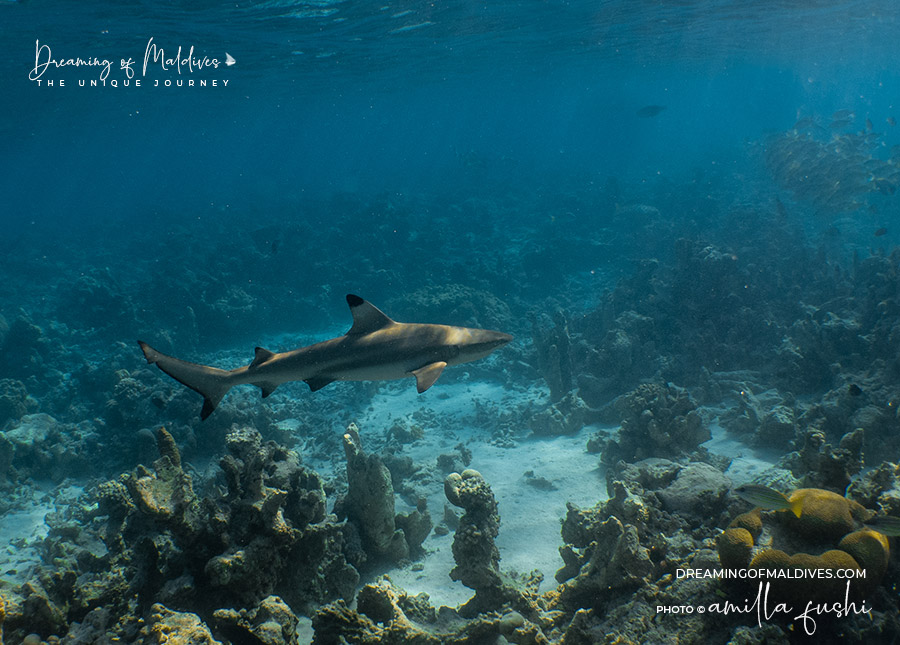
The blacktip reef shark is the most common shark in the Maldives. You may have already seen a video of sharks alone or in small pack swimming along the beach. Although impressive for a novice eye, these scenes are often narrated with exaggeration to generate some kind of "buzz".
They are not dangerous nor a risk for any human. These sharks are simply babies learning to hunt on their own, their mother being totally devoid of maternal instinct.
Blacktip Reef Sharks are abundant in the Maldives. Juveniles learn to hunt on the beach, once adults, they will stay around the island house-reefs.
In Maldives, these young blacktip reef sharks can be found wandering alone, but you will usually see them hunting in groups of 6 to 10 members. They measure about 50 cms/1.5 ft long. Adult blacktip sharks can measure up to a little more than 2 meters and are often found on the drop-offs of the islands.
During your stay, you will probably see them on the beach or while snorkeling, at a few meters away. They are very shy and will quickly will move away if approached.
Observe them from afar, it is such a precious opportunity to observe them in their natural habitat and without scuba diving.
Scientific name : Carcharhinus melanopterus.
The Picasso triggerfish

The picasso triggerfish is part of the large family of the triggerfishes, of which several species can be seen in the Maldives. This fish which can reach up to 30 cms ( around 1 feet ) is a real work of art, – hence its name. It has such magnificent patterns and colors that it is compared to a painting.
The patterns and colors of the Picasso Triggerfish make it look like a work of art. What a wonderful nature…
In Maldives, you can meet the picasso triggerfish alone, in shallow lagoons, digging with its mouth in the sand or around corals to find its food, mainly composed of small invertebrates and algae.
The Picasso behaves just like the rest of its family.
All triggerfishes are territorial and have very small teeth. They will not hesitate to attack to protect their eggs, are disturbed or feel threatened.
They also have retractable spines on their dorsal fin that they will lock into an erect position to protect themselves from predators. This is why they are called Triggerfishes.
If you go snorkeling at night you may see them sleeping on their side.
Finally, to make this beautiful fish even more interesting, it sometimes makes small growling sound when surprised or angry.
Scientific name: Rhinecanthus aculeatus
The Oriental sweetlips
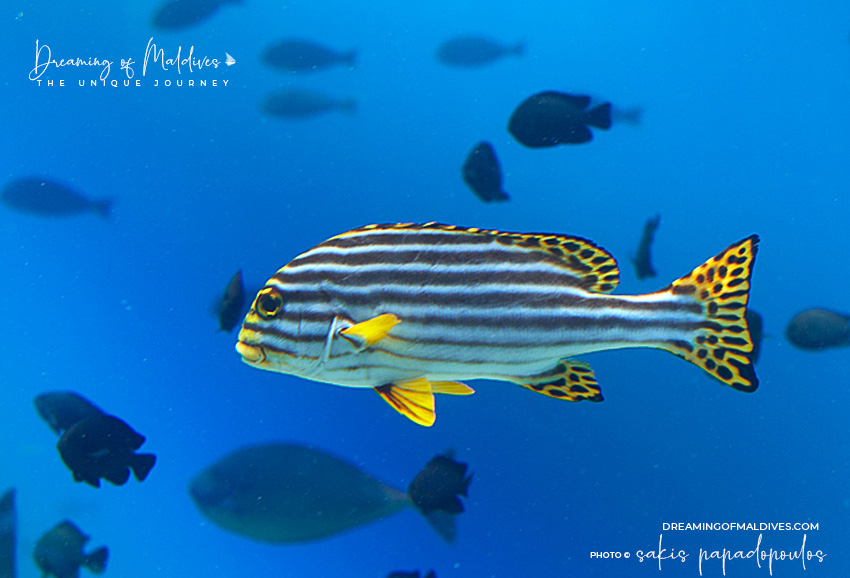
The oriental sweetlips is a beautiful fish with graphic patterns and contrasting colors.
This fish has a double pattern : stripes and spots, and owns its "Sweetlips" name due to its very large fleshy lips.
The term "Oriental" comes from the fact that it is only found in the oriental part of the Indo-Pacific region.
The Oriental Sweetlips "grinds" its teeth and has such big lips that it is called "Sweetlips" in English.
Day and night, you will see it on all Maldives reefs, wandering around, in search of small invertebrates which are its main food source. The oriental sweetlips is found alone or in schools according to its maturity : adults have a gregarious behavior, meanwhile juveniles are often alone.
The oriental sweetlips also has the particularity to emit small grunts when it rubs its teeth together. The sound is also amplified by a part of its abdomen, the gas- bladder, making it easily heard underwater.
Scientific name: Rhinecanthus aculeatus
Snorkeling and Fishes in Maldives
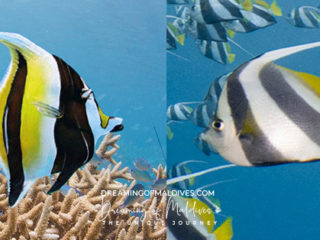
The Moorish Idol is often confused with the Schooling Bannerfish or its cousin the Pennant Coralfish. In order for you to know if you are…

Soneva has launched an ambitious programme to restore coral reef systems and create a coral hub for the Maldives with Coralive. Soneva…
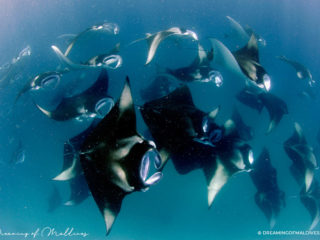
Welcome to Hanifaru Bay, the World's largest known aggregation of Manta Rays and a Whale Shark hotspot where each summer, the sea giants…

Dhigurah, which means Long Island in Dhivehi, is considered as one of the most beautiful island in the Maldives. Voted in the World's…
Sources for details about each fish biology and anatomic names on :
Data of Observations for the Recognition and Identification of the Underwater Fauna and Flora / doris.ffessm.fr (in french).
Follow us on Facebook, Youtube and Instagram
for more Maldives Dreams & Stories
Your TOP Best Maldives Resorts 2022 YOUR CHOICE. YOUR DREAM. YOUR VOICE
[ Official ]
Traveler's Choice
11th Edition
Source: https://www.dreamingofmaldives.com/maldives-blog/10-common-fishes-you-will-meet-while-snorkeling-in-maldives/
0 Response to "When You Dreamed of Fishes Funny Memes"
Post a Comment